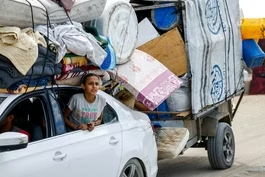
How China’s boycott of American soybeans affects farmers
Clip: 10/12/2025 | 6m 41sVideo has Closed Captions
Minnesota farmers struggle to stay afloat as China boycotts U.S. soybeans
Farm bankruptcies were already on the rise when President Trump's trade war added to the financial pressures on America's soybean farmers. Now, the world’s largest soybean consumer, China, has stopped buying American beans in a retaliatory move against the Trump administration. Megan Thompson visited two Minnesota farmers to hear what's on their minds this harvest season.
Problems playing video? | Closed Captioning Feedback
Problems playing video? | Closed Captioning Feedback
Major corporate funding for the PBS News Hour is provided by BDO, BNSF, Consumer Cellular, American Cruise Lines, and Raymond James. Funding for the PBS NewsHour Weekend is provided by...

How China’s boycott of American soybeans affects farmers
Clip: 10/12/2025 | 6m 41sVideo has Closed Captions
Farm bankruptcies were already on the rise when President Trump's trade war added to the financial pressures on America's soybean farmers. Now, the world’s largest soybean consumer, China, has stopped buying American beans in a retaliatory move against the Trump administration. Megan Thompson visited two Minnesota farmers to hear what's on their minds this harvest season.
Problems playing video? | Closed Captioning Feedback
How to Watch PBS News Hour
PBS News Hour is available to stream on pbs.org and the free PBS App, available on iPhone, Apple TV, Android TV, Android smartphones, Amazon Fire TV, Amazon Fire Tablet, Roku, Samsung Smart TV, and Vizio.
Providing Support for PBS.org
Learn Moreabout PBS online sponsorshipJOHN YANG: Farm bankruptcies were already on the rise when President Trump's trade war added to the financial pressures on America's soybean farmers.
To hear what's on their minds this harvest season, special correspondent Megan Thompson visited two farmers in Minnesota.
MEGAN THOMPSON (voice-over): Mother Nature has been kind this year to Ryan Mackenthun, who farms about 2,200 acres of corn and soybeans near Brownton, Minnesota.
Great weather has met better than average yields.
And the sun was shining during his soybean harvest in early October.
RYAN MACKENTHUN, Soybean farmer: When you can get a run of a week straight of, you know, 80s weather with nice wind, I mean, you can combine a lot of beans.
The weather's just been fantastic.
MEGAN THOMPSON (voice-over): What's not fantastic?
Just as Mackenthun brings his crops off the field, the world's largest soybean consumer, China, has stopped buying American beans.
RYAN MACKENTHUN: It's really nerve wracking.
The looming tariffs over us have made it just difficult to predict anything.
MEGAN THOMPSON: Ed Usset is a grain market economist at the University of Minnesota.
ED USSET, University of Minnesota: This is harvest time, and traditionally our biggest sales are from September to the end of the calendar year.
And Usset says the biggest chunk of those sales usually goes to China.
ED USSET: Over the last decade, we've routinely sent a billion bushels to billion two just to China every year.
That represents 25 percent of our total soybean demand in the United States.
MEGAN THOMPSON (voice-over): But since May, China has bought zero American soybeans after the Chinese government slapped tariffs on them, a retaliatory move in the Trump administration's ongoing trade war.
RYAN MACKENTHUN: I'll finish this little strip, turn around.
MEGAN THOMPSON (voice-over): And as demand plummets, so does the price.
Caught in the middle are farmers like Ryan Mackenthun, whose great, great grandfather started this farm in 1887.
When we visited, he was just finishing up combining his first field of the day.
Most every year, he puts his soybeans into big storage bins on his farm and sells them throughout the year, trying to eke out a bigger profit when and if the price rises.
But this year he's reversed course completely, is selling his haul right away at the local grain elevator.
RYAN MACKENTHUN: So on that load I had 371 bushels of soybeans got paid $9.13 a bushel.
It's a dollar below what I got for most of my beans last year.
My fear is that the price is even going to get worse and worse as we go along if we don't have that demand for soybeans.
MEGAN THOMPSON (voice-over): Mackenthun is fearful because he's seen that happen before.
In 2018, a similar trade war pushed prices down to around $8 a bushel.
But it means he' his soybeans for less than what it cost to produce them.
With the prices of fertilizer and farm equipment ever increasing, he figures he's losing about $100 per acre, or about $90,000 on his soybeans.
RYAN MACKENTHUN: It's overwhelming on how to manage all these costs when we plant on good faith that the market will be there to support all our costs.
Yeah, it's emotionally demanding to try to balance all of it.
MEGAN THOMPSON (voice-over): Just a few miles away, Bob Lindeman is also veering off his usual harvest plan.
BOB LINDEMAN, Soybean Farmer: With the beans we normally would sell right off the field, we're putting them into these bins.
MEGAN THOMPSON (voice-over): Unlike Mackenthun, Lindeman's holding on to most of his beans, crossing his fingers the market will improve.
BOB LINDEMAN: Oh, it's for sure a risk.
You know, putting them in the market could go down.
I'm hoping that we can get some of these tariffs taken care of.
MEGAN THOMPSON (voice-over): But Lindeman doesn't have a place on his own farm to store the soybeans, so he's renting space from his neighbor, which will increase his costs.
BOB LINDEMAN: Right now we're using one, two, three, four possibly 5 bins on his farm site.
MEGAN THOMPSON (voice-over): Not selling now means he may need to take out a federal loan for the first time in more than a decade to help pay his bills.
And when he does sell, it'll take a lot of time and labor.
BOB LINDEMAN (voice-over): I'll be hauling a load every second to third day from now until next year just to get it all emptied out.
I really don't want to be doing that, but we need to try and make every cent extra we can this year.
MEGAN THOMPSON (voice-over): Ed Usset, who advises farmers on these types of complicated decisions, says they're used to factoring in risk, but this level of uncertainty is making those decisions exponentially harder.
ED USSET: There's a difference between uncertainty and risk.
Risk is something you can measure uncertainty.
Is this trade war going to be resolved in the next month, six months, one year?
Your guess is as good as mine.
MEGAN THOMPSON (voice-over): In September, on a call with Chinese President Xi Jinping, President Trump discussed TikTok, not soybeans.
And he's threatened to cancel an in person meeting with Xi later this month.
In the meantime, his administration is said to be putting together a multibillion dollar bailout package to help make up farmers losses.
DONALD TRUMP: And we're going to take some of that tariff money that we made.
We're going to give it to our farmers.
MEGAN THOMPSON (voice-over): Ryan Mackenthun appreciates the help, but -- RYAN MACKENTHUN: Nobody likes a bailout.
It's a short term band aid.
We need long term fixes.
MEGAN THOMPSON (voice-over): And he's worried about long term damage to the export markets because China has now found other trading partners in Argentina and Brazil.
Ed Usset's also concerned China is learning something.
ED USSET: They have an incredible appetite for soybeans and they can feed all their needs from South America.
That's what they're learning right now.
MEGAN THOMPSON (voice-over): Farmers want to sell more of their products here in the U.S.
and are hopeful about a Trump administration plan to boost biodiesel made from American soybeans.
ED USSET: Renewable diesel it is expanding quickly in the United States, but it's not covering that gap anytime soon.
MEGAN THOMPSON (voice-over): And so as farmers in Minnesota move on to harvest their corn crop, they want their leaders in Washington to understand what's at stake.
BOB LINDEMAN: Well, I'd say let's not worry quite as much about TikTok and this and that.
Let's worry about this ag sector.
You keep agriculture healthy.
It keeps a lot more jobs and a lot more people financially set throughout this United States.
RYAN MACKENTHUN: When farmers are profitable, we spend our money on new equipment which turns around and helps our economy.
To do that, though, we need profitability, we need certainty.
We need a vision of a future, of where farming will be someday.
MEGAN THOMPSON (voice-over): For PBS News weekend, I'm Megan Thompson in Brownton, Minnesota.
Aid begins to flow into Gaza as Trump heads to Israel
Video has Closed Captions
Clip: 10/12/2025 | 5m 27s | Desperately needed aid begins to flow into Gaza as Trump heads to Israel (5m 27s)
Documentary argues Orwell's greatest fears are materializing
Video has Closed Captions
Clip: 10/12/2025 | 8m 27s | Documentary argues George Orwell's greatest fears are materializing (8m 27s)
Providing Support for PBS.org
Learn Moreabout PBS online sponsorship
- News and Public Affairs

FRONTLINE is investigative journalism that questions, explains and changes our world.

- News and Public Affairs

Amanpour and Company features conversations with leaders and decision makers.












Support for PBS provided by:
Major corporate funding for the PBS News Hour is provided by BDO, BNSF, Consumer Cellular, American Cruise Lines, and Raymond James. Funding for the PBS NewsHour Weekend is provided by...

